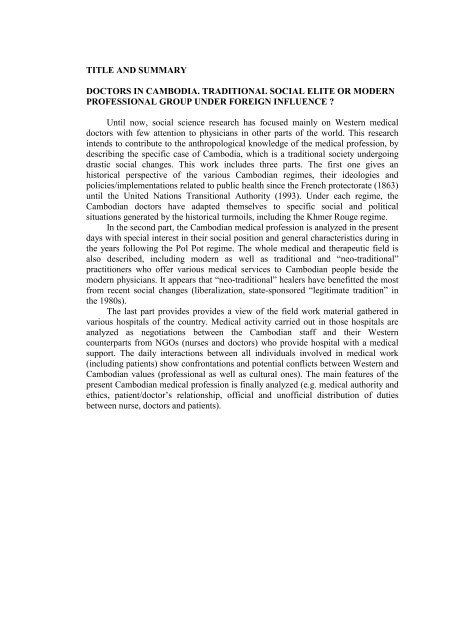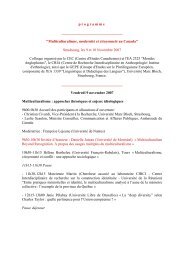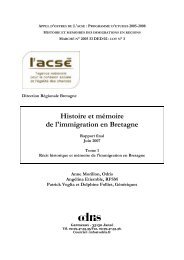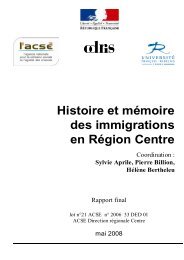- Page 1:
ECOLE DES HAUTES ETUDES EN SCIENCES
- Page 5 and 6:
REMERCIEMENTS J'exprime toute ma gr
- Page 7:
SOMMAIRE REMERCIEMENTS ............
- Page 10 and 11:
ABREVIATIONS A.P.R.O.N.U.C. Autorit
- Page 13 and 14:
I - CHEMINEMENT Le choix d'étudier
- Page 15 and 16:
15 réfugiés cambodgiens et sur la
- Page 17 and 18:
17 cambodgien, produits par des O.N
- Page 19 and 20:
19 Monsieur Ung Paen 1, par exemple
- Page 21 and 22:
21 foncières des dernières année
- Page 23:
PREMIÈRE PARTIE POUR UNE ANTHROPOL
- Page 26 and 27:
26 appelés Cham ou “Khmers Islam
- Page 28 and 29:
28 Les Chams sont, eux, plutôt pê
- Page 30 and 31:
30 voilà plusieurs milliers d'ann
- Page 32 and 33:
32 depuis quelques années déjà,
- Page 35 and 36:
CHAPITRE II LES TRADITIONS DE RECHE
- Page 37 and 38:
37 d'Angkor Vat figurant, tel le sy
- Page 39 and 40:
39 rites agraires des Khmers1. L'é
- Page 41 and 42:
41 III - L'ANALYSE POLITIQUE DES CO
- Page 43:
43 n'a pas permis le renouvellement
- Page 46 and 47:
I - L'ETUDE DES MEDECINS, UN SUJET
- Page 48 and 49:
48 “créent” des médecins diff
- Page 50 and 51:
50 s'attache à décrire le contenu
- Page 52 and 53:
52 (médecin traditionnel), par tra
- Page 54 and 55:
54 Dans cette perspective, on est a
- Page 56 and 57:
56 l'ethnographie - en forme de pro
- Page 58 and 59:
58 Dans un autre contexte, occident
- Page 60 and 61:
60 thérapeutique permet donc d'ana
- Page 63 and 64:
CHAPITRE IV METHODOLOGIE Les donné
- Page 65 and 66:
II - Univers familiaux 65 Dans les
- Page 67 and 68:
67 gloire de l'Etat de Cambodge et
- Page 69 and 70:
69 du niveau administrativo-hospita
- Page 71 and 72:
71 réalisation des programmes sani
- Page 73 and 74:
73 quand ils nous sollicitaient1, e
- Page 75:
75 social différentes. Les médeci
- Page 79 and 80:
Au cours de notre enquête auprès
- Page 81 and 82:
CHAPITRE I MÉDECINE COLONIALE FRAN
- Page 83 and 84:
83 logique de la lente “marche ve
- Page 85 and 86:
85 Carte I - Les étapes de l'inter
- Page 87 and 88:
87 fonctionnaires et possède un po
- Page 89 and 90:
89 Malgré une organisation politiq
- Page 91 and 92:
91 pêcheries sont affermées par l
- Page 93 and 94:
93 aperçu sous les traits d'un adm
- Page 95 and 96:
III - L'ORGANISATION POLITIQUE DE L
- Page 97 and 98:
97 Phnom Penh, où s'installent la
- Page 99 and 100:
99 La peinture que nous en ferons a
- Page 101 and 102:
101 de la Santé1 estime que le Pro
- Page 103 and 104:
103 médecin français mais ce sont
- Page 105 and 106:
105 marins de grade élevé, quant
- Page 107 and 108:
107 choix du médecin, de prescript
- Page 109 and 110:
109 L'Indochine constitue en effet
- Page 111 and 112:
111 Le vaccin s'améliore grâce à
- Page 113 and 114:
113 sanitaire - et encourt les risq
- Page 115 and 116:
115 sous certaines conditions, à l
- Page 117 and 118:
117 praticiens gardent un statut su
- Page 119 and 120:
119 Le mince poids démographique d
- Page 121 and 122:
121 Huit ans plus tard, on chercher
- Page 123 and 124:
123 Ces considérations sur les par
- Page 125 and 126:
125 grands cris à toute occasion,
- Page 127 and 128:
127 annamites” 1 ont pour vérita
- Page 129 and 130:
129 La position est d'autant plus i
- Page 131:
131 pouvoir en 1975), seront plus d
- Page 134 and 135:
134 pays dans l'Union Française et
- Page 136 and 137:
136 multiples petits partis, au mom
- Page 138 and 139:
138 Tableau IV - Aide étrangère r
- Page 140 and 141:
140 première car elle menace le pa
- Page 142 and 143:
142 Les pays socialistes ne sont pa
- Page 144 and 145:
144 nationale, tendent à contrer c
- Page 146 and 147:
146 restera une “coquille creuse
- Page 148 and 149:
148 en effet, c'était un bureau te
- Page 150 and 151:
150 Tableau V - Nombre d'établisse
- Page 152 and 153:
152 résurrection khmères qu'il fa
- Page 154 and 155:
154 l'appellation de “fondation d
- Page 156 and 157:
156 La crise qui s'annonce est sér
- Page 158 and 159:
158 coupés des négociations. Le d
- Page 160 and 161:
160 d'“infirmiers supérieurs”
- Page 162 and 163:
162 4 - La prévention, sous l'égi
- Page 164 and 165:
164 La lutte contre la tuberculose
- Page 166 and 167:
166 moyens à partir de 1964 pour s
- Page 168 and 169:
168 les moyens matériels sont souv
- Page 170 and 171:
170 Sa position dans le champ médi
- Page 172 and 173:
172 3 - La défense des intérêts
- Page 174 and 175:
174 pour un emploi mal payé et con
- Page 176 and 177:
176 Le Cambodge indépendant, dirig
- Page 179 and 180:
CHAPITRE III LE TEMPS DES RUPTURES.
- Page 181 and 182:
181 des services publics, dont le s
- Page 183 and 184:
183 première mission envoyée à l
- Page 185 and 186:
185 époque de pénurie. Cette diff
- Page 187 and 188:
187 Tableau VI - Budget du Ministè
- Page 189 and 190:
189 chargeait d'incarner à elle se
- Page 191 and 192:
191 humain effroyable (de 600 000
- Page 193 and 194:
193 explique pourquoi la recherche
- Page 195 and 196:
195 indochinoise sous tutelle fran
- Page 197 and 198:
197 Plusieurs de ces communistes de
- Page 199 and 200:
199 Le second événement est la d
- Page 201 and 202:
201 presque inhumaines, une dureté
- Page 203 and 204:
203 Photo Ia - Entrée des soldats
- Page 205 and 206:
205 destructuré la société. Les
- Page 207 and 208:
207 B - Le système de santé khmer
- Page 209 and 210:
209 L'idéologie de l'auto-suffisan
- Page 211 and 212:
211 La santé et l'éducation, dans
- Page 213 and 214:
213 dépôt d'Anlong Vil (à vingt
- Page 215 and 216:
215 révolutionnaires sous le gouve
- Page 217 and 218:
217 au moins, des anciens hôpitaux
- Page 219 and 220:
219 réaliste n'a pas permis de cou
- Page 221 and 222:
221 politiques et à elles seules -
- Page 223 and 224:
223 Tableau VII - Hiérarchie médi
- Page 225 and 226:
225 hôpital du Dix-Sept Avril) et
- Page 227 and 228:
227 Si les biomédecins ont parfois
- Page 229 and 230:
229 Après son doctorat et quelques
- Page 231 and 232:
231 devient insuffisante et certain
- Page 233 and 234:
233 de Oudong (à une vingtaine de
- Page 235 and 236:
235 b - Les déportés : les tares
- Page 237 and 238:
237 milliers d'autres, vers la rout
- Page 239 and 240:
239 pas de place pour lui dans l'é
- Page 241 and 242:
241 père Canard” (ta tea, taTa)
- Page 243 and 244:
243 modifier de façon radicale la
- Page 245 and 246:
245 Nous sommes partie, commençant
- Page 247:
Tableau VIII - Position des médeci
- Page 251:
Poursuivons l'analyse macrosociolog
- Page 254 and 255:
254 Vietnamiens responsables de tou
- Page 256 and 257:
256 Schéma I - L'invasion du Cambo
- Page 258 and 259:
258 factions d'opposition. La guér
- Page 260 and 261:
260 Mais le nombre de cadres ainsi
- Page 262 and 263:
262 Tableau IX - Evolution de la co
- Page 264 and 265:
264 l'échelon provincial (vice-pr
- Page 266 and 267:
266 Mais l'on observe, dans les fai
- Page 268 and 269:
268 Carte V - Triangle Ho Chi Minh
- Page 270 and 271:
270 abri correct, une alimentation
- Page 272 and 273:
272 Photo II - Hôpital du Deux-Dé
- Page 274 and 275:
274 fournitures diverses ; voilà d
- Page 276 and 277:
276 Les avantages qu'offrent les pr
- Page 278 and 279:
278 possible de s'arranger lorsque
- Page 280 and 281:
280 Tableau X - Personnel médical
- Page 282 and 283:
282 Photo III - Cérémonie d'entr
- Page 284 and 285:
284 dans une langue étrangère mal
- Page 286 and 287:
286 De ces expériences professionn
- Page 288 and 289:
288 pratique hospitalière au Cambo
- Page 290 and 291:
290 De la même façon, on peut obs
- Page 292 and 293:
292 au régime politique : l'absenc
- Page 294 and 295:
294 Après avoir évoqué la terrib
- Page 296 and 297:
296 responsable technique dont les
- Page 298 and 299:
298 aussi la politique... c'est-à-
- Page 300 and 301:
300 Les références aux salaires s
- Page 302 and 303:
302 néanmoins d'un niveau de reven
- Page 304 and 305:
304 compte comme si, depuis la nuit
- Page 306 and 307:
306 (dans l'actuel Laos) au Sud de
- Page 308 and 309:
308 se manifeste dans la tradition
- Page 310 and 311:
310 1877, les richesses naturelles1
- Page 312 and 313:
312 B - Les essais peu concluants d
- Page 314 and 315:
314 les usines de production de mé
- Page 316 and 317:
316 Le second point de vue exposé
- Page 318 and 319:
318 Photo IV -Bonzes visitant une f
- Page 320 and 321:
320 leur interaction1 - fût-ce de
- Page 322 and 323:
322 kru, bonzes, médiums, masseuse
- Page 324 and 325:
324 directement, soit, le plus souv
- Page 326 and 327:
326 peu abandonné. “Je dois main
- Page 328 and 329:
328 est attaché par la cheville au
- Page 330 and 331:
330 sont décédés sous le régime
- Page 332 and 333:
332 ethnologique faite fréquemment
- Page 334 and 335:
334 Photo V - Bay sey Phnom Kulen,
- Page 336 and 337:
336 Après la consultation, le kru
- Page 338 and 339:
338 Le kru Kaev ne perçoit pas d'h
- Page 340 and 341:
340 sert, qu'il est “pur” (bori
- Page 342 and 343:
342 laquelle les malades soignés l
- Page 344 and 345:
344 Plus jeune que ses confrères1
- Page 346 and 347:
346 Photo VIIa - Une médium près
- Page 348 and 349:
348 pour ses activités de contreba
- Page 350 and 351:
350 notamment, la grande diversité
- Page 352 and 353:
352 rouge vif, signe que le vent es
- Page 354 and 355:
354 La seconde partie du massage -
- Page 356 and 357:
356 et assistent, au milieu des cla
- Page 358 and 359:
358 les consultants, bien que cette
- Page 360 and 361:
360 proposés. Cette tendance s'obs
- Page 362 and 363:
TYPES DE THERAPEUTE Types de légit
- Page 364 and 365:
364 anthropologique des individus d
- Page 366 and 367:
366 A défaut d'étude systématiqu
- Page 368 and 369:
368 peuvent pas “se remettre corr
- Page 370 and 371:
370 n'en attend pas des “miracles
- Page 372 and 373:
372 impossible à envisager pour un
- Page 374 and 375:
374 Photo VIII - Arrivée d'un mala
- Page 376 and 377:
376 Tableau XIV - Raisons des choix
- Page 378 and 379:
378 Tableau XV - Importance de la d
- Page 380 and 381:
380 Graphique IIIa - Recours théra
- Page 382 and 383:
382 leur attribue. Une infime parti
- Page 384 and 385:
384 quand il s'agit de l'entrée du
- Page 387:
QUATRIEME PARTIE LA PROFESSION MEDI
- Page 390 and 391:
390 Certaines des motivations de no
- Page 392 and 393:
392 présentée ultérieurement dan
- Page 394 and 395:
394 territoire conduit à des expul
- Page 396 and 397:
396 Carte VI - Les camps de réfugi
- Page 398 and 399:
398 cent vingt-sept en 19941, la pl
- Page 400 and 401:
400 C'est dire la tension au sein d
- Page 402 and 403:
402 milieu des années 1980, ils pr
- Page 404 and 405:
404 II - UNITE ET VARIETE DES PHILO
- Page 406 and 407:
406 Cependant, l'on notera que cett
- Page 408 and 409:
408 Document 1 - Les difficultés d
- Page 410 and 411:
410 Tableau XVIIa - O.N.G. et relig
- Page 412 and 413:
% 412 Graphique VII - Budgets compa
- Page 414 and 415:
414 Graphique VIII - Origines des O
- Page 416 and 417:
416 mission1), ainsi qu'un hôpital
- Page 418 and 419:
418 Concrètement, les étrangers e
- Page 420 and 421:
420 Document 2 - Objectifs à réal
- Page 422 and 423:
422 parfaite de l'idéologie humani
- Page 424 and 425:
424 avaient souffert, etc. mais mai
- Page 426 and 427:
426 ne voient-elles pas de difficul
- Page 428 and 429:
428 sur le terrain par la suite. Je
- Page 430 and 431:
430 Le don possède donc, dans la s
- Page 432 and 433:
432 A - La barrière linguistique e
- Page 434 and 435:
434 cinq heures1. Je n'en ai pas eu
- Page 436 and 437:
436 Tout est mis en œuvre pour pr
- Page 438 and 439:
438 entend avoir à l'hôpital. Mai
- Page 440 and 441:
440 Le directeur - Ils ne sont pas
- Page 443 and 444:
CHAPITRE II STATUTS SOCIAUX, STATUT
- Page 445 and 446:
445 prestations gratuites, soit pou
- Page 447 and 448:
447 professionnelle supplémentaire
- Page 449 and 450:
449 En quelques mois, les hôpitaux
- Page 451 and 452:
451 - Suzanne (s'adressant à moi)
- Page 453 and 454:
453 qui n'a pas toujours été int
- Page 455 and 456:
455 objectifs divergents des uns et
- Page 457 and 458:
457 d'un certain goût “asiatique
- Page 459 and 460:
459 quels que soient leurs grades e
- Page 461 and 462:
461 rend au marché deux fois par j
- Page 463 and 464:
463 humanitaire de transfert des co
- Page 465 and 466:
465 amères se doublent d'un aveu d
- Page 467 and 468:
467 coton à carreaux à usages mul
- Page 469 and 470:
469 maladie, de la vieillesse, du d
- Page 471 and 472:
471 telle “bienveillance universe
- Page 473 and 474:
473 ses souhaits et de faire entend
- Page 475 and 476:
475 d'une pneumonie sévère - malh
- Page 477:
477 patients. “Produits sociaux
- Page 480 and 481:
480 - I - Entreprenant cette étude
- Page 482 and 483:
482 Ainsi, à chaque moment de son
- Page 484 and 485: 484 généralisation et l'accélér
- Page 486 and 487: 486 noyau de base de la société c
- Page 488 and 489: 488 en organisant l'enseignement m
- Page 491 and 492: BIBLIOGRAPHIE 1. AGAMBEN Giorgio, M
- Page 493 and 494: 493 29. BIBEAU Gilles, “From Chin
- Page 495 and 496: 495 60. Crimes et répercussions da
- Page 497 and 498: 497 90. FAINZANG Sylvie, “L'inté
- Page 499 and 500: 499 122. GUENEL Annick, “Sexually
- Page 501 and 502: 501 148. HUARD Pierre, “La médec
- Page 503 and 504: 503 180. LEVI-STRAUSS Claude, Anthr
- Page 505 and 506: 505 210. MONNAIS-ROUSSELOT Laurence
- Page 507 and 508: 507 241. PRUD'HOMME Rémy, L'écono
- Page 509 and 510: 509 271. THIERRY Solange, Le Cambod
- Page 511: ANNEXES
- Page 514 and 515: 514 1965 - Signature d'un pacte mil
- Page 517 and 518: ANNEXE II - LA DIVERSITE DE L'AIDE
- Page 519: ANNEXE III - PERSONNEL MEDICAL ET P
- Page 522 and 523: médicaux 522 C - Usines et centre
- Page 524 and 525: E. Hygiène générale 524 * Etabli
- Page 526 and 527: 526
- Page 528 and 529: 528 IV - Les médecins indochinois
- Page 530 and 531: 530 2 - Le nouveau personnel : l'ur
- Page 532 and 533: 532 ANNEXES .......................
- Page 536: RÉSUMÉ Jusqu’à présent, les m






